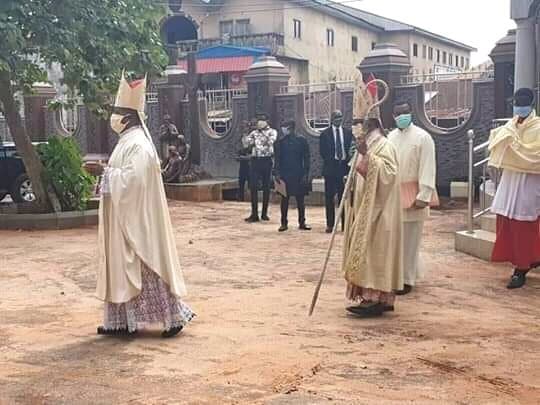A Nigerian bishop who was blocked from taking over the Diocese of Ahiara for years was last week installed as Bishop of Ekwulobia, hopefully ending a crisis that has shaken the Church in Africa’s most populous nation.
Bishop Peter Ebere Okpaleke was appointed to Ahiara by Pope Benedict XVI in 2012, but a group of priests and laity rejected him because he came from a different ethnic group, leading to a years-long standoff that prevented him from being installed in the diocese.
Okpaleke was installed April 29 as the bishop of the new Ekwulobia Diocese, after renouncing his appointment to Ahiara in 2018 in an effort to resolve the situation.
Okpaleke was appointed by Francis to the new see on March 5, with territory taken from the Diocese of Awka.
Reports say the bishop was well received in his diocese, and his installation was attended by the governor of Anambra State and several bishops, though attendance was heavily restricted due to the coronavirus pandemic.
Thousands of faithful who weren’t able to attend the event because of government restrictions were able to follow the Mass via livestream on Facebook.
During his inaugural remarks, Okpaleke said that he will focus much of his ministry on the family, saying that it’s the foundation of the Catholic Church and the place where new vocations arise.
“New sensitivity and commitment to the good of the people of God in our communities,” is needed, he said, reflecting on the impact of COVID-19 among the faithful. “We are committed to the witness of the Church as a family. Therefore, it’s necessary to invest time, energy, emotion in this unity of the family, also as a domestic Church.”
“God wants to remind us that the Church is, primarily, the unity of the people of God,” Okpaleke said.
The unity that is the family, he insisted, affects society as a whole as well as the Church.
The crisis in Ahiara
Okpaleke resigned his position as the bishop of Ahiara in Feb. 2018 with a letter in which he said that it was “no longer beneficial to the Church” for him to hold his position. It came just over eight months after Pope Francis threatened to suspend any priest who refused to accept him.
On June 8 2017, Pope Francis issued a seemingly unprecedented threat, giving the priests of the diocese a 30-day deadline to accept the bishop or be suspended. The request had already been made by Italian Cardinal Fernando Filoni, of the Vatican’s Congregation for the Evangelization of Peoples, which oversees missionary territories. His request was sent to the priests in a letter dated June 24, 2014.
Reportedly, most priests from the diocese complied with the pope’s ultimatum, sending their letters to Francis.
However, it’s hard to pin down not only precisely how many priests replied, but even how many priests there are. The Vatican gives one number (110), those who support the bishop claimed 157 of some 200 priests sent the required letter, and those who oppose Okpaleke fluctuate between asserting there are between 500 to 700 priests. This discrepancy in numbers could be partially explained by priests originally from Ahiara being ordained for other dioceses or religious orders also responding to the pope’s request.
Despite the letters, Okpaleke was never able to set foot in Ahiara.
The Diocese of Ahiara is one of the most Catholic in the nation, with about 400,000 Catholics out of a total population of 500,000. It also has numerous vocations to the priesthood and religious life.
The Ahiara clergy rejected Okpaleke, a member of the southeastern Igbo tribe, claiming the local Mbaise people were being sidelined when it comes to the appointment of bishops. Yet by choosing a man for a different diocese to lead the southern Ahiara, the Vatican was upholding a long-standing tradition in Africa of not allowing choices for bishops to be defined by tribal affiliations.
RELATED: After dramatic papal threat, Nigerian diocese remains badly split
When Okpaleke’s resignation from Ahiara was announced, the Vatican released a statement saying that “for the time being, the Holy Father does not intend to appoint a new bishop” and had instead named Bishop Lucius Iwejuru Ugorji of Umuahia, 20 miles away, the new apostolic administrator.
Today, the diocese is still led by the apostolic administrator, and although life is almost back to normal – priestly ordinations have resumed, as have the confirmations – Ahiara is still without a titular bishop.
Follow Inés San Martín on Twitter: @inesanma












